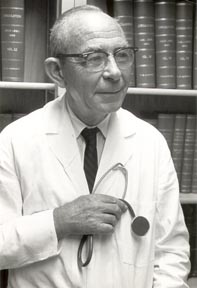Tinsley Harrison’s name pops up frequently on the University of Alabama at Birmingham campus. There’s a building named in his honor, draped with a bust of his likeness, on University Boulevard. An endowed professorship is soon to become an endowed chair. Medical students are active in the Tinsley Harrison Research Society. And every medical student, resident and physician — at UAB and around the world for the past six decades — has read his landmark medical text, Harrison’s Principles of Internal Medicine.
 |
| UAB Archives |
Tinsley Randolph Harrison, M.D., was one of the most influential physicians of the 20th century, and his legacy at UAB dates to the founding of the medical school in Birmingham. He was the second dean of the Medical College of Alabama, which became the School of Medicine at UAB, and was the first chair of the UAB Department of Medicine.
Now UAB will honor Harrison’s legacy by naming its internal medicine residency program for him. Effective Nov. 1, 2011, the University of Alabama at Birmingham Tinsley Harrison Internal Medicine Residency Program is one of the few residency programs in the country named for an individual. The three-year program currently has 135 resident physicians.
Harrison is perhaps best known for his textbook, Harrison's Principles of Internal Medicine, published in 1950, translated into 14 languages and reprinted 18 times. It remains the single-most-used, best-selling internal medicine text in the world.
School officials say naming the residency program after Harrison, a pioneer in medical education and a key player in the development of UAB as a nationally known academic medical center, will help imbue future generations of physicians with the core values that Harrison espoused.
“In today’s world of changing requirements for graduate medical education, we are committed to preserving that which Dr. Harrison valued most: the patient/doctor relationship, clinical reasoning and professionalism,” said Lisa Laycock Willett, M.D., associate professor of medicine and co-director of the internal medicine residency program.
Glenn Cobbs, M.D., a professor emeritus at UAB, began his career under Harrison’s tutelage.
“Dr. Harrison was the best academic physician of the 20th century,” said Cobbs. “His research, teaching and patient care produced three world-class departments of medicine, including UAB’s. He taught us to always do what is right, not what is best, in all of life’s endeavors.”
Selena Stuart, M.D., a chief resident in internal medicine and, like Harrison, a native of Alabama, thinks naming the residency program in his honor will help future residents build a strong foundation.
“I am very excited and proud about the program being renamed for Dr. Tinsley Harrison,” Stuart said. “In this era of modern-day medicine, our new name reflects the program’s commitment to preserving Dr. Harrison’s legacy through excellence in medical education and commitment to our patients.”
Harrison was born in 1900 in Talladega and moved to Birmingham in 1906 with his parents. His father was a physician; in fact, Tinsley Harrison was the seventh generation in his family to practice medicine.
He earned his medical degree from Johns Hopkins University in Baltimore and did his internship and first-year residency in Boston at the Peter Bent Brigham Hospital. After a second year as a resident at Johns Hopkins, he became the first chief resident physician for the new Vanderbilt Hospital and Medical School in Nashville in 1925.
After 16 years at Vanderbilt, Harrison became the founding chair of medicine at Wake Forest University’s Bowman Gray School of Medicine in Winston-Salem, N.C. He left in 1944 to serve as dean of medicine and chair of medicine at his third new school, the Southwestern Medical School in Dallas, Texas.
Harrison’s arrival in Alabama in 1950 marked his fourth new medical school, where he helped initiate a rapid period of growth that included recruitment of nationally known physicians from the faculties of such institutions as Harvard University and the Mayo Clinic. This period saw the School of Medicine rise from local to international prominence.
Harrison retired in 1970 to become a Distinguished Physician of the U.S. Veterans Administration, where he remained until his death Aug. 4, 1978.
Harrison authored or co-authored three books: Failure of the Circulation, Principles of Internal Medicine and Principles and Problems of Ischemic Heart Disease. He was president of the American Society of Clinical Investigation and the American Heart Association, which presented him the Gold Heart Award in 1963. The Association of American Physicians awarded him the Kober Medal in 1967, and the American College of Physicians gave him Mastership Award in 1964 and the Distinguished Teacher Award in 1970.